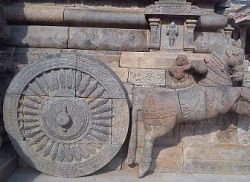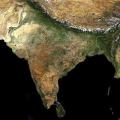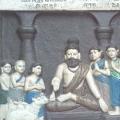3. Kingdom for a Horse: India in the Vedic Period
The Vedic period sets the historical context of the Upaniṣads, Buddhism and Jainism.
Themes:
S. Jamison and J. Brereton (trans.), The Rigveda: The Earliest Religious Poetry of India (Oxford 2014, 4 vols.)
G. Flood, An Introduction to Hinduism (Cambridge: 1996).
P. Olivelle, “Kings, Ascetics and Brahmins: the Socio-Political Context of Ancient Indian Religions,” in V. Krech and M. Steinicke (eds), Dynamics in the History of Religions between Asia and Europe (Leiden: 2012), 117-136.
R. Thapar, The Penguin History of Early India from the Origins to AD 1300 (London: 2002).
R. Thapar, Readings in Early Indian History (Oxford: 2013).
E.J. Rapson, Ancient India From the Earliest Times to the First Century AD (Cambridge: 2011).
R.S. Sharma, India’s Ancient Past (Oxford: 2006).

Origins


 ..
..



Comments
Indian Philosophy Challenge
Hello Peter,
First the obligatory preface: I've listened to every single podcast from start, blah, blah, blah... I admire the voice and the insight you bring, etc. and I wouldn't change a thing. I am in it for both sides: history and philosophy. Now that's over, I'm going to mount a challenge.
I think you owe your listeners an explanation for the differing initial premises you have adopted between HPWAG1 and HPWAG2-India. In the beginning of HPWAG1, you very clearly, and traditionally, defined philosophy as what happens when thinkers differentiate themselves from religion and superstition. So Thales gets to go first precisely because he thought not-Hesiod and not-Homer thoughts. Therefore, you had no necessity to take your listener into the origins and details of Greek religion.
Likewise with other religions that may have interacted historically with the development of Greek, or Western, philosophy, such as Mazdaism. You certainly mentioned the pagan religious practices, but only to highlight how philosophy either broke from them decisively, or folded them into some rational system. This pattern seems to have steered you away from any kind of broad treatment of traditional judeo-christian religious sources for philosophical thought, the Old Testament especially, but we could broaden that avoidance to include Egyptian and Mesopotamian ur-sources.
Now, we listeners are confronted with an embrace of early religious sources in vedic India, as the natural and unavoidable ur-source for that civilization's unique philosophical production. Why the difference in approach? Does India have a special permit that western philosophy does not? Does the western tradition preclude religio-historical investigations that India requires?
Let me make it clear that I personally believe the western philosophical tradition does indeed ground itself in earlier and contemporaneous religious forms of thought, however much it attempts to distinguish rational from mythic modalities. Yet the definition has presented itself so strongly that your own natural impulse was to follow it, and begin, substantively, with Thales, not Hesiod.
The issue is especially acute when compared to the one you have used with India, because the vedic religion is almost certainly related to the Homeric religious ensemble, as well as the proto-Persian (western aryan), as well as the pre-historic Celtic, Germanic, and Slavic religions. It would seem that if we trace Indian philosophy from Indian religion, we are somehow obligated to trace "something" from these pagan beginnings in europe as well.
And there is yet more deep questions arising from a consideration of the ancient Near East and its several thousand years of civilized intellectual production, which almost certainly influenced the Greeks, perhaps beginning with the Ionians (Thales). There is no doubt that their productions in math, astronomy, medicine, etc. may be deemed rational, but their thinking remained religious, not philosophical? I use a question mark here because I am myself quite unconvinced, and it seems they get cut off from the "timeline of philosophy" more because we simply don't know enough, or because, well, they were not Greek. I will not even mention the Hebrews, except twice already.
The challenge, it seems to me, is that including Indian philosophy has imposed a certain responsibility for HPWAG to fill in the above mentioned gaps. We need to go back to Khufu and Gilgamesh. We need to hear what the Druids refused to write.
In reply to Indian Philosophy Challenge by Karl Tyson
Sort of accepting the challenge
Hi, and thanks for that kind and well argued note. The difference of approach is (at least in part) simply that I have changed my views since i started HoPWaG, when really I was thinking more in terms of covering what is traditionally seen as philosophy, but in lots of detail and no chronological gaps. That was 5 years ago (almost exactly, in fact) and as I've done this I have come to think that one needs to have a broader approach, in part precisely because it is hard to fit in traditions like classical India. So, if I were doing it over now I would certainly start HoPWaG with a look at Homer and Hesiod as background and I might do more on ancient civilizations. Though I don't want to go "backwards" in the main podcast narrative, I will get another chance to do this anyway when we get to African philosophy, which will happen after India is done. Our plan is to do at least one episode surveying ancient Near East traditions as context for ancient Egypt, which is where we're going to start those series.
Thanks again for your post!
Vocabulary question
Hi Prof. Adamson,
I love your work and have listened to every episode in the main series. Now I've belatedly started listening to the additional series, and they're equally excellent.
My question is a small one, and in light of all the unusual words terms jargon and names you use it may seem surprising: What's the long word that you use when discussing how traditional understandings of the Aryan migration may seem racist?
Thanks again!
PS. I follow you on Twitter as @cj_sheu!
In reply to Vocabulary question by CJ Sheu
Vocab
Um... not sure which word you mean. Is it in this paragraph? If not maybe tell me the time index of where it turns up in the episode. Thanks by the way for listening to so much of the series!
"But it is along the Indus River that our story, or rather backstory, begins. This was the site of the Harappa and Mohenjo-daro civilizations, which existed before the coming of the Aryans. These were not primitive societies. They had well laid out cities and the Harappans traded with people as far away as Mesopotamia. Though some of their writing has survived, it unfortunately has not been possible to decipher the Harappan script. In fact we don’t even know to which language group it belonged: possibly Dravidian, a group which includes Tamil and some other languages. Certainly there were numerous languages spoken in the subcontinent prior to the coming of the Aryans, and influence from these languages can be detected in the Sanskrit of the Vedic literature. The story of the Aryans’ arrival to India has provoked a good deal of speculation, indeed wild speculation, indeed ideologically inspired fantasy dressed up as sober scholarship. It used to be thought that the Aryans swept into the region as conquerors, unstoppable on their horse-drawn chariots, only to be slowly corrupted by the inferior races of India as they mingled with them over the generations. Now, scholars not only reject such racist descriptions of the process, but also lean towards thinking that the Aryans gradually migrated into India rather than overwhelming the region militarily."
In reply to Vocab by Peter Adamson
Yes! It was "ideologically."
Yes! It was "ideologically." Apparently you chuckled during the third syllable, and I mistook it for a v or f or something. Thanks!
RE these podcasts
I'm studying Vedic & Buddhist philosophy in my undergraduate degree and these resources have been so helpul in contextualising the development of Indian philosophy chronologically. Really enjoying the podcasts!
Thank you!
East-West
Dear Peter,
Your description of the Indus River Valley being in the northeast of the Indian diamond is incorrect. It should be northwest.
A friend mine was of the opinion that people raised in North America frequently confused east and west because "The East" was to their west, and "The West" was predominantly to their east. Or perhaps in this case it was due to all those years in London, where West Ham Utd are from the East End.
Personally, rather than a diamond, I always like to think of the Indian subcontinent as an enormous ice-cream cone, with the Himalayas as the ice-cream.
Regards.
A pedant.
In reply to East-West by Cardinal Pedant
Pedantry
Oh yes, good point. I should have used the "Never Eat Shredded Wheat" mnemonic to remember which is which!
Add new comment